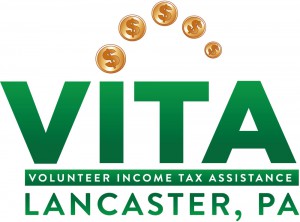 You might have seen the billboards along Route 283 and elsewhere urging taxpayers to dial 211 for free tax preparation by members of the Volunteer Income Tax Assistance (VITA) program.
You might have seen the billboards along Route 283 and elsewhere urging taxpayers to dial 211 for free tax preparation by members of the Volunteer Income Tax Assistance (VITA) program.
VITA, run by the United Way of Lancaster County for the past seven years, has more than a dozen tax sites across the county, with IRS-trained volunteers, who can, if the client fits the requirements, assist with taxes for free. Elizabethtown College just happens to be one of those sites, and the volunteers just happen to be students who earn college credits for taking part in the program.
Volunteer tax assistance, begun by H. Marshall Pomroy, an associate professor of business at E-town from 1964 to 1999, has been taking place at the College for more than 30 years—long before the IRS and United Way affiliation. Then, when Terrie Riportella, director of the accounting program, came to E-town in 2002, she reached out to the IRS to become part of the certified VITA program.
The students gain empathy for someone with three kids who lives on $18,000. It’s a perspective you can’t learn in a textbook.”
Last year, VITA sites served more than 3,700 clients, returning more than $4.26 million in tax refunds and credits and saving clients more than $750.000.
Through VITA, the students—usually accounting majors—are trained and tested by the IRS for certification to prepare simple wage-earner tax returns. “They are tested in ethics and learn about the software,” Riportella said. This year there are 12 students who, together, will prepare 150 returns.
When a client calls the College to make an appointment an administrative assistance goes over a checklist to qualify them. “There are five questions asked to weed out those who don’t fit,” Riportella noted. They must make less than $52,000 and need assistance to prepare a basic tax return; they can’t own a business, have a rental property, a foreclosure or military pay. “The returns are not complex,” she said, noting that most of the clients are in the older population or younger families.
When the client meets with a student volunteer, documents and information are collected to finalize the tax return, then the student works on the forms on his or her own time, sending them to Riportella for review. “We do not do them on the spot,” Riportella said. “The students take their time with them. There is a learning and education component.”
From start to finish the filing takes about three weeks. “As the students get more comfortable with the software the returns go faster,” Riportella said. And, if a student feels the return is too complicated, they notify the professor and adjustments are made.
To get two credits, students must finalize about 12 returns and write a reflection paper at the end of the program. In addition to earning credits, students also earn respect for those with less. “It’s eye opening,” Riportella said. “The students gain empathy for someone with three kids who lives on $18,000. It’s a perspective you can’t learn in a textbook.”
Senior Chris Hartman said he completed about a dozen tax returns when he participated in the program last year. “It gave me a sense of pride and accomplishment for helping out the surrounding community,” he said. “Taxes can be a very confusing subject and using my knowledge taught by Professor Riportella I was able to get the largest refunds possible for these clients.”
Other advantages for the students, Riportella said, are the opportunity to use the software that will be the same or similar to software they’ll use in the work world and developing workplace skills—communication, accountability, scheduling. Adding his participation in the program to his resume is a bonus Hartman said. “VITA was a great way to take the classroom knowledge and relate it to real world problems. The program also teaches you a lot more than you learn in class and you have to learn how to research on your own,” he said. “The interaction with the clients also creates better communication skills and how to talk about taxes in simple terms.”
“It’s a little different education. … I enjoy having this as opposed to normal classroom environment,” said Riportella, noting that it’s a win-win situation. Students have hands-on learning and the community benefits. “This gives access for a lot of people in the community who need their refund and who would go to H&R Block. It saves them a couple hundred dollars.” Students are not permitted to accept payment or contributions of any sort. “They can take cookies, but that’s about it,” she said, laughing.
Client visits can be scheduled by calling 717-361-1270. Appointments begin Feb. 3 and continue through the end of March.

